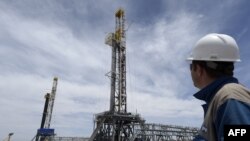"We and the UAE are increasing our production capacity. We and the UAE are increasing our refining," Saudi Arabia's Energy Minister Prince Abdulaziz bin Salman said.
Sultan Al Jaber, the head of UAE oil giant ADNOC, warned that under-investment could cause a shock to the world economy that would make recent convulsions look like a "minor tremor."
"The world needs all the solutions it can get. It is not oil and gas, or solar, not wind or nuclear, or hydrogen... it is all of the above," Al Jaber said.
Both officials insisted that oil remains a cornerstone of energy supply, but said they were working to lower emissions and increase production from renewable or less-polluting sources.
Although the OPEC+ grouping slashed oil production this month -- ignoring pleas from Western leaders including US President Joe Biden -- long-term energy needs will trend higher, they said.
"If we zero out hydrocarbon investment, due to natural decline, we would lose five million barrels per day of oil each year from current supplies," Al Jaber said.
"This would make the shocks we have experienced this year feel like a minor tremor. If this year has taught us anything, it taught us that energy security is the foundation of all progress."
The Abu Dhabi International Petroleum Exhibition Conference (ADIPEC), where the Saudi and UAE ministers spoke, opened just over a week before COP27, where representatives from nearly 200 countries will take part in the latest round of climate negotiations.
COP26 last year ended with a pledge to keep global warming at 1.5 degrees Celsius over pre-industrial levels -- a goal the world is set to miss on current emission trends.
Fossil fuels are "by far" the largest contributor to climate change, accounting for 75 percent of the world's greenhouse gas emissions, according to the United Nations.
However, the West has clamoured for greater production as petrol prices and inflation soared following Russia's invasion of Ukraine.






